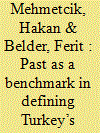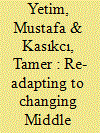| Srl | Item |
| 1 |
ID:
178478


|
|
|
|
|
| Summary/Abstract |
Iranians’ struggle for democracy has dominated the contemporary history of the country for the last century. These attempts have often resulted in the emergence of authoritarian regimes rather than institutionalizing democracy in the body of the state. Scholars and politicians often consider the process of institutionalism of democracy in Iran to be a top-down approach toward political reform. The literature on the topic either focuses on economics and its associated politics or industrialization and legal reform as keys to success but often ignores the social foundations of institutionalism of democracy and, in the process, undermines their roles. Transition to democracy in Iran requires a social context based on Habermas’ “Tripartite of Knowledge,” and these conditions democratize the construction of a social system that prioritizes rational inquiry, socio-moral knowledge, and sociopolitical knowledge, and the need is to form a democratic society in line with the realization of political democratization.
|
|
|
|
|
|
|
|
|
|
|
|
|
|
|
|
| 2 |
ID:
178475


|
|
|
|
|
| Summary/Abstract |
This article deals with Turkey’s status politics since the 2000s, by employing an aspirational constructivist approach that links social psychology with social constructivism in international relations. It focuses on the temporal side of status, stemming from historical identity construction in Turkish foreign policy (TFP) rhetoric and practices under the rule of the Justice and Development Party (JDP) since 2002. Turkey’s status politics is motivated by its past legacies rather than by a peer-to-peer comparison. Therefore, different variances and practices of identity politics in TFP offer valuable insights into its status-seeking practices. The article offers five images of the past that define various role sets and status claims for Turkey.
|
|
|
|
|
|
|
|
|
|
|
|
|
|
|
|
| 3 |
ID:
178477


|
|
|
|
|
| Summary/Abstract |
Turkey’s relations with Egypt abruptly hit rock bottom following the Egyptian army’s ousting of Mohammed Morsi in July 2013. Despite significant political fluctuations between the two countries, there is a gap in academic literature about addressing alterations in Turkish–Egyptian relations holistically. To this end, this article proposes that Turkey’s volatile relationship with the Egyptian governments since the so-called Arab Spring is partially a reflection of broader institutional changes in Turkey’s domestic settings. One of these salient changes is the discursive transformation of Turkish national self-perception. This article shows how Turkey’s new governmental self-understanding of “majoritarianism” manifests in its relations with Egypt. It asserts that this transformation in the governmental perception of the national-self made Turkey’s policies on Egypt, which oscillate between one extreme to another, “conceivable/thinkable” via the medium of national identity discourses. It shows the interplay between the governmental identity discourses of the Justice and Development Party (AKP) elites and Turkey’s policies on Egypt in the institutional/non-discursive foreign policy field.
|
|
|
|
|
|
|
|
|
|
|
|
|
|
|
|
| 4 |
ID:
178476


|
|
|
|
|
| Summary/Abstract |
This article investigates the current modification in Turkey’s actor perception according to the Middle East’s changing dynamics. Clarifying the shift in Turkish foreign policy under the Justice and Development Party (JDP) and the emergent structural realities in the Middle East as a result of increasing agency of the violent non-state actors (VNSAs) in the aftermath of several Arab revolutions, the current article scrutinizes the adaption of Turkish foreign policy to these regional realities. In this context, to prove Turkey’s active orientation toward the recent regional environment, its exceptional engagement with one of the important VNSAs, namely the Free Syrian Army (FSA) or Syrian National Army (SNA), has been empirically examined. Within this background, the current resurrection of the VNSAs in the Middle East and regional-global actors’ reactions to this reality will also be analyzed. Afterward, Turkey’s unique and swift compliance with this reality and the consequent modification of its actor perception will be explored.
|
|
|
|
|
|
|
|
|
|
|
|
|
|
|
|
| 5 |
ID:
178474


|
|
|
|
|
| Summary/Abstract |
This article surveys Hezbollah’s sectarian mobilization to justify its early engagement in Syria’s civil war for what was an intervention in a geopolitical confrontation to implement its agenda in coordination with its regional allies. Generally speaking, sectarian relations can be driven from both above as well as below. The article first argues that Hezbollah is a sectarian party whose timing of emergence paralleled with the rise of the Shia in Lebanon and the adjoining region. It contends that Hezbollah instrumentalized its sectarian identity and adopted a sectarian mobilization policy ahead of its engagement in Syria’s conflict. However, as its fighters were expanding across the country, Hezbollah’s sectarian discourse altered to a more politics-centric discourse. Therefore, this article concludes that the falsely framed sectarian conflict in Syria is sect-coded, Hezbollah adopted a top-down politicization of sectarian identity, and its primary aim was to prevent the regime’s collapse, which would have tilted the regional balance of power in favor of its rivals rather than seeking religious truths on Syria’s soil.
|
|
|
|
|
|
|
|
|
|
|
|
|
|
|
|